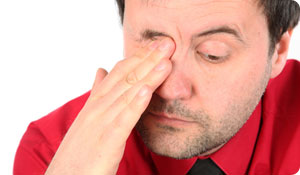
Allergy eyes (also known as allergic conjunctivitis) can occur when you're exposed to an allergy trigger that causes your body to release histamines and other chemicals into your blood stream.
This can cause the blood vessels in your eyes to swell and can result in a host of eye symptoms. Seasonal allergens such as grass and pollen are often to blame, but indoor allergies from pet dander, dust mites, and mold can also cause eye allergies as well.
Minimize Exposure
The best way to seek allergy eye relief is to avoid the reaction in the first place:
- Keep your windows closed
- Stay indoors during times when the pollen count is high
- Wear sunglasses to keep pollen and other irritants out of your eyes
- Ban pets from your bedroom
- Use allergy-proof bedding
- Eliminate curtains, rugs, books and household accessories that can attract dust
- Avoid medications, creams, or other personal beauty products that could be further irritating your sensitive eyes
Treat Your Symptoms
Of course many allergy eye triggers are difficult to completely avoid, so you may also need to seek allergy eye relief in the form of the different treatment options available both over-the-counter and in prescription strength. Review the following choices you can try:
-
Artificial tears can relieve dry eyes and can be soothing, too. They can also help to wash allergens out of the eye area.
-
Eye drops that contain an antihistamine and decongestant can help to reduce some of the redness, irritation, and itching that allergies can cause. (Just ask the pharmacist before using these long term since extended use can actually cause symptoms to get worse.)
-
Eye drops that contain mast cell stabilizers can head off an allergic reaction before it begins.
-
Your doctor can also prescribe an eye drop that contains a combination of mast cell stabilizers and antihistamines. This can prevent a new reaction and at the same time treat any symptoms that already exist.
-
Nonsteroidal anti-inflammatory eye drops (also referred to as NSAIDS) can be used to treat severe itching. Corticosteroids can reduce itching too, along with redness and swelling, but they may have side effects. So take them with caution and not for too long.
-
Oral antihistamines can also reduce some of the symptoms. (Just keep in mind that they can also cause your eyes to become drier, so this can end up backfiring and may actually make your symptoms worse so use with great care.)
A Final Note
If none of these options offer enough of the allergy eye relief you seek, consider getting allergy shots to minimize allergic reaction to your triggers. Allergy shots can help reduce your allergy eye symptoms over time.
Sources:
American College of Allergy, Asthma and Immunology
http://www.acaai.org/public/eyeALLERGY/eyeBrochure.htm
The Mayo Clinic
http://www.mayoclinic.com/health/allergy-medications/AA00037/NSECTIONGROUP=2





